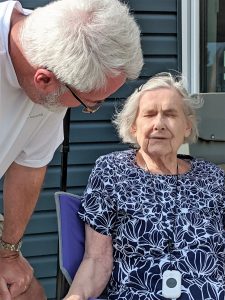Retirees: How to Plan for the Next Pandemic
Covid-19 Wake Up Call
 ©www.lindaleierthomason.com
©www.lindaleierthomason.com
Many rejoiced! Covid was over. Life was getting back to ‘normal’.
Or, so it was thought until the recent Delta variant crept back into the everyday news cycle.
For a few brief months, when all believed this nasty virus was tamed with vaccines, Americans delighted in seeing families coming together again to celebrate and reconnect.
What Will We Do Differently?
While we all tepidly approach our public lives again it’s time to pause a bit and ask what was learned during the pandemic.
At Craft LifeStyle Management we see children finally getting back into their parent’s homes. Grandchildren into grandparent homes and neighbors into older friend’s homes.
Some of what is found and reported is heartbreaking.
Real Life Story
Recently we were asked by an out-of-state family member to enter their father’s local home. Of course, they’d been frequently visiting with him via the telephone during the pandemic since he was unable to manage other modern communications.
He always sounded good on the phone-laughing, joking and openly reporting what he’d eaten. He claimed he had no problem getting up and down the stairs and that his laundry was being done. Much laughter was had when he told a story about stained clothing from all of the cooking he’d been doing.
The out-of-state family had groceries delivered. A family friend about their dad’s age regularly checked on him by calling and driving by.
Everyone was doing their best to keep dad safe since he has cancer and COPD.
Here’s what was really going on during COVID times.
Dad lied. Or, perhaps didn’t want to alarm, or bother, anyone.
The Truth
The family received their vaccines and confirmed dad had his. “Yup, all taken care of.”
They came to visit-all excited to hug and see each other.
To their dismay and heartbreak, when they arrived at the family home, it was nothing like their anticipated “Norman Rockwell family gathering.”
It was pure sorrow.
He was not washing clothes or cleaning. He was depressed and lonely.
He was not eating well.
Sure, the groceries were delivered; however, he didn’t want to cook. Instead, he ate all processed food and snacks. Thank goodness he had access to these even if they were mostly unhealthy.
Dad was unable to get up and down the stairs where his bed was. Instead, he was sleeping, eating and basically surviving on the couch.
The family took him directly to the emergency room 40 minutes away. He was not admitted but was given liquids and sent home.
Outcome
Dad is now living with his out-of-state family. He is not happy about having to abruptly leave him home, causing another level of depression.
The family is trying their best to figure this out.
What Learned
-
Telephone calls, Zoom meetings and Facebook messages cannot take the place of in-person interactions. The pandemic highlighted the fact that many older people are not familiar, or comfortable, with the latest technology and struggle to make meaningful contact with loved ones.
-
Parents have a habit of sheltering their children from bad news.
-
There is an increased awareness of taking care of one’s mental health. Globally, the impact on mental health from the pandemic has been devastating. There will be no “normal” way to adjust and re-acclimate to life after the events of this past year. A Kaiser Family Foundation poll reported that up to 45 percent of adults experienced negative mental health effects due to the pandemic – and an even higher percentage in those who serve as family caregivers for older senior loved ones.
-
Retirees are experiencing a role reversal. During the pandemic parents were getting instructions from their children. “Don’t leave the house. Order groceries online. Watch church services on your computer, etc.” Many are trying to understand what these roles look like post pandemic.
-
Easing back into the real world can be hard. Regaining physical strength and emotional resilience are necessary to thrive in this new post pandemic world.
Most were living in fear and isolation for so long it’s hard not to want to emerge fully confident and active. However, after months of inactivity and diet changes, and likely lost muscle mass, it’s best to take it slow to adjust to this still uncertain world.
-
Adult children gained insight about their own retirements and how they want to age. Where would they want to live during a pandemic? Are they financially prepared? Would they be able to support themselves in an economic downturn?
-
Families are discussing adapting their houses and lifestyle to have their parents share a home with them.
-
Senior-living industry is adapting to this upheaval, planning for the future. Some have moved isolation units to the main floor instead of upper floors, allowing for access to the outdoors for fresh air and sunshine. Many placed clear panels in doorways so residents could see and talk safely to visitors. Future buildings will likely have smaller groups of units in the building rather than several dozen units down a long hallway. Even the HVAC systems are being re-thought-circulating air over smaller areas. And, communal dining and group activities will now likely be reinvented and done in smaller groups.
How can we help you and your loved ones? Let us know.
Can I speak to your organization or group? Contact me. Contact – Craft Lifestyle Management (craftlifestylemgt.com)
©August 2021 Craft LifeStyle Management.
All Rights Reserved.
